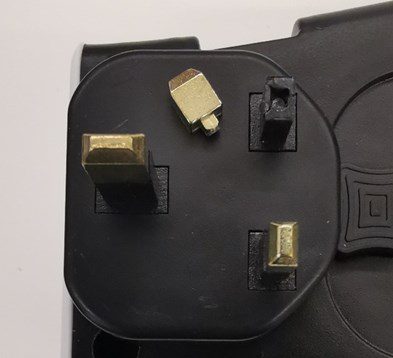A strain on households’ finances caused by the cost-of-living crisis is pushing shoppers to second-hand electrical goods as an alternative to new, a new survey reveals.
Research commissioned by consumer safety charity, Electrical Safety First, shows more than 40% of consumers are considering buying second-hand electricals as an alternative to brand new products, specifically due to the cost-of-living crisis, as households continue to feel the squeeze.[i]
More than 2,000 UK adults were surveyed across the UK as part of the Charity’s work to highlight the unintended safety consequences of the cost-of-living crisis as part of its ‘Saving Safely’ campaign.
Further findings revealed that of those who had purchased second-hand electrical goods in the last 12 months, more than 1 in 3 said their decision to do so was entirely influenced by the current cost-of-living crisis.[ii]
The charity is urging the public to ensure they perform spot checks of older, second-hand electrical goods that could present a risk due to damage, years of wear and tear or be subject to a safety recall.
Clothes, Kitchen Appliances & Handheld devices:
Analysis into the types of second-hand goods shoppers have purchased in the last 12 months, due to the cost-of-living crisis, shows clothes and books topped the list, whilst 1 in 6 consumers had purchased a second-hand white good, such as a fridge, tumble dryer or washing machine.
Second-hand handheld smart gadgets, such as mobile phones and tablets proved popular amongst those surveyed with 1 in 7 having purchased one, whilst almost 10% had bought beauty appliances, such as hairdryers or hair straighteners, second-hand.[iii]
Younger shoppers:
The research by Electrical Safety First also indicates that financial pressures caused by the cost-of-living crisis may be hitting younger people hardest, specifically in relation to consumer purchasing habits of electrical goods.
Of all age groups surveyed about their likeliness to purchase second-hand electrical goods, in place of new, due to the cost-of-living crisis, almost two thirds of 25-34 year-olds admitted they were more likely to do so – higher than any other group.[iv]
Trusted retailers:
eBay and Facebook Marketplace were the most prominent go-to places for second-hand electrical goods amongst general consumers, as community culture for shopping grows. In-person community shopping also proved popular for those surveyed with more than 1-in-6 having purchased a second-hand electrical good from a car boot sale.[v]
Yet second-hand goods purchased online and at community led events, such as car boots sales, can introduce a level of risk, as individual sellers may not perform adequate checks to ensure the products they are selling-on are safe.
Further research found that just over 1 in 4 shoppers checked if their purchase was subject to a safety recall, whilst almost half did not check for any visible damage to the cable or plug of the product.[vi]
Research showed that 48% of consumers who had purchased a second-hand electrical item in the past had experienced issues with it, including around 1 in 6 saying the item did not work correctly or at all.[vii] More concerningly 1 in 8 reported issues with overheating of the product they purchased.[viii]
Electrical Safety First is warning consumers to protect themselves with some simple checks before parting with their cash so that their saving does not end up being a costly mistake.
Martyn Allen, Technical Director of Electrical Safety First, commented: “With the dramatic rise of household bills, it’s no wonder consumer spending is shifting towards second-hand goods, as an alternative to new. However, buyers should beware their savvy shopping doesn’t turn into a costly mistake.
“Check the product you’re buying isn’t recalled and that it is fitted with a UK plug. Ensure cables aren’t frayed or wires exposed and always register a second-hand product when you get it home. Second-hand goods can be great for saving money and better for the environment, but no purchase should ever leave you at risk.
“Some charity shops have processes in place to ensure electrical goods are safe for resale, such as the British Heart Foundation and are a safer alternative for households to buy with confidence.”
Allison Swaine-Hughes, Retail Director at the British Heart Foundation, said: “The BHF’s 180 home stores are the biggest high street retailers of preowned electrical goods in the UK, selling over 40,000 TVs on average each year. You’ll have complete peace of mind and be confident that every donated electrical item we sell has been function tested to work correctly and is safe to use. Every item is also independently PAT tested (portable appliance testing) and labelled to show it has been checked.
“Customers can buy in confidence knowing we provide a six month guarantee on all donated electrical items and in the event of any problem with the item, all we ask is customers provide a proof of purchase when returning it to us.”
Check for a recall
You can also use the model and serial number present on the product to make sure the product you’re buying hasn’t been the subject of a recall. Electrical Safety First has an online product checker to track recalled products.
Check the plug
If you’re purchasing your product from a UK seller, look to see whether the appliance has a three-pin UK plug, which should also include a fuse. More information on checking plugs can be found on our site here.
Look for a legitimate safety certification label
All electrical products will have one or more safety certifications on their label if made by a legitimate manufacturer. Asking for the instruction manual will also help to confirm legitimacy of the product.
Register your product
Electrical appliances should have a model and serial number present on the product. Consumers can use this to register it. Registering your product makes it easy for the manufacturer to get in touch with you if it turns out that the item you’ve bought is somehow faulty or dangerous.
Stick to reputable charity stores:
Whilst some independent third-party sellers may check the safety of goods they sell on privately, there is no guarantee any such check will have taken place. By going to well-known charity stores who have formal processes in place for checking goods, such as the British Heart Foundation, consumers can be confident that electrical goods are checked before being sold to the public. Ensure that you ask the charity store about their processes before buying.
[i] Of 2,001 general adults surveyed across the UK a net total of 41.98% were ‘more likely’ to buy second hand electrical goods due to the cost of living crisis in response to the question ‘Q1. How much more likely or less likely are you to buy/consider buying second-hand electric goods (as an alternative to new) due to the cost-of-living crisis?’ The figure is a compiled total of those who replied either ‘somewhat more likely’ or much more likely’.
[ii] Of the 887 adults within the survey who had purchased a second hand electrical goods in the past 12 months 33.82% answered ‘my decision was entirely influenced by the current cost of living’ to the question ‘How much was your decision to buy second-hand in the last year influenced specifically by the cost-of-living crisis?’
[iii] Of the 2,001 adults asked the question ‘Which of the following, if any, are you likely to consider buying second-hand in 12 months or have purchased second-hand in the last 12 months, as an alternative to purchasing brand new due to the cost-of-living crisis?’ 40% said they had purchased second hand clothes in the last 12 months, whilst 27.89% said they had purchased second hand books. 15.84% said they had purchased a kitchen appliance such as a dishwasher, washing machine, fridge or tumble dryer in the same time frame. 14.49% of those surveyed said they had purchased a handheld personal device second hand such as a mobile phone or tablet whilst 9.50% said they had purchased beauty appliances such as hair dryers, hair straighteners or curlers in the last 12 months.
[iv] Of the 336 adults aged between 25-34 asked the question ‘ How much more likely or less likely are you to buy/consider buying second-hand electric goods (as an alternative to new) due to the cost-of-living crisis?’ 63.10% said they were either ‘Much more likely’ or ‘Somewhat more likely’
[v] Of the 1047 adults surveyed who previously bought second hand electrical goods asked ‘When you have bought second-hand electrical goods, where did you purchase them? (Tick all that apply)’35.43% said eBay, 31.14% said Facebook Marketplace, 16.91% responded with ‘Car boot sales’
[vi] Of the 1047 adults surveyed who previously bought second hand electrical goods asked ‘When you buy second-hand goods, do you check the product for any of the following? (Tick all that apply)’ 29.42% responded with ‘Whether the product has been subject to a product recall’. 53.68% responded with ‘Visible damage to the cables and/or plug’.
[vii] Of the 1047 adults surveyed who previously bought second hand electrical goods asked ‘What problems, if any, have you encountered with any of the electrical goods that you have bought second-hand? (Tick all that apply)’ 17.10% responded with ‘Not working correctly or at all’
[viii] Of the 1047 adults surveyed who previously bought second hand electrical goods asked ‘What problems, if any, have you encountered with any of the electrical goods that you have bought second-hand? (Tick all that apply)’ 12.13% responded with ‘Overheating’

| [donate]
| Help keep news FREE for our readersSupporting your local community newspaper/online news outlet is crucial now more than ever. If you believe in independent journalism,then consider making a valuable contribution by making a one-time or monthly donation. We operate in rural areas where providing unbiased news can be challenging. |


















